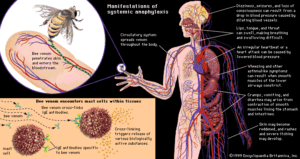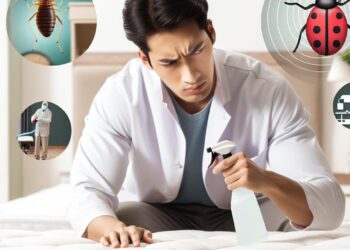Introduction
Pests are a common problem in many households, and they can be more than just a nuisance. Certain pests, such as dust mites, cockroaches, and rodents, can trigger allergies and asthma symptoms in susceptible individuals. In this article, we explore the connection between pests and allergies and provide tips for managing pest-induced allergy symptoms.

The Link Between Pests and Allergies
Pests can trigger allergies in different ways. For example, cockroach droppings, saliva, and body parts can contain allergens that can cause allergic reactions in sensitive individuals. Dust mites, which are microscopic pests that thrive in warm and humid environments, are also a common allergen trigger. They feed on dead skin cells and can be found in bedding, carpets, and upholstery. Other pests, such as rodents and fleas, can also carry allergens on their fur or excrement, which can cause respiratory symptoms and skin irritation.
Symptoms of Pest-Induced Allergies
Pest-induced allergies can cause a range of symptoms, including sneezing, runny nose, congestion, itchy and watery eyes, coughing, wheezing, and skin rashes. In severe cases, they can also lead to asthma attacks, which can be life-threatening. It’s important to note that not everyone who is exposed to pests will develop allergies, but those who are already allergic to other environmental triggers may be more susceptible.
Managing Pest-Induced Allergy Symptoms There are several ways to manage pest-induced allergy symptoms, including:
- Pest Control Measures: The most effective way to prevent pest-induced allergies is to eliminate the pests that are triggering them. This may involve sealing cracks and crevices, fixing leaks, keeping food stored in airtight containers, and regular cleaning and vacuuming. Pest control professionals can also provide targeted treatments that are safe and effective in getting rid of pests.
- Allergy Medications: Over-the-counter and prescription allergy medications can help manage symptoms such as sneezing, runny nose, and itchy eyes. They work by blocking histamine, a chemical that is released in response to allergens.
- Immunotherapy: For those with severe or persistent allergies, immunotherapy may be an option. This involves exposing the individual to small amounts of the allergen over time, with the goal of desensitizing the immune system and reducing allergy symptoms.
Pests can be more than just a nuisance; they can also trigger allergies and asthma symptoms in susceptible individuals. Understanding the link between pests and allergies is key to managing pest-induced allergy symptoms effectively. By taking proactive pest control measures and seeking medical treatment, those with pest-induced allergies can reduce their symptoms and improve their quality of life.
Preventing Pest-Induced Allergies

Prevention is always better than cure, and the same holds true for pest-induced allergies. Here are some tips to prevent pest infestations and minimize your exposure to pest allergens:
- Keep your home clean and dry: Pests thrive in warm and humid environments, so it’s essential to keep your home clean and dry. Wipe down surfaces regularly, vacuum carpets and upholstery, and remove clutter that can provide hiding places for pests.
- Store food properly: Pests are attracted to food, so it’s essential to store it properly. Keep food in airtight containers, and don’t leave pet food out for extended periods.
- Seal entry points: Pests can enter your home through even the tiniest of cracks and crevices. Seal all entry points, including gaps around windows and doors, and repair any leaks or moisture issues that can attract pests.
- Use pest control measures: Pest control measures such as traps, baits, and sprays can help eliminate pests and prevent infestations. However, it’s important to use them safely and correctly, as some products can be toxic to humans and pets.
Managing Pest-Induced Allergy Symptoms
If you’re already experiencing pest-induced allergy symptoms, there are several steps you can take to manage them effectively. Here are some tips:
- Identify the allergen: Knowing which pest is triggering your allergies is key to managing your symptoms effectively. Consult with an allergist or pest control professional to identify the allergen and develop a targeted treatment plan.
- Take allergy medications: Over-the-counter and prescription allergy medications can help manage symptoms such as sneezing, runny nose, and itchy eyes. They work by blocking histamine, a chemical that is released in response to allergens.
- Practice good hygiene: Good hygiene practices such as washing your hands frequently, bathing regularly, and wearing clean clothes can help minimize your exposure to pest allergens.
- Consider immunotherapy: For those with severe or persistent allergies, immunotherapy may be an option. This involves exposing the individual to small amounts of the allergen over time, with the goal of desensitizing the immune system and reducing allergy symptoms.
Pest control professionals use a variety of methods to control pest populations, including chemical treatments, traps, baits, and exclusion techniques. However, when it comes to pest-induced allergies, it’s essential to choose a pest control company that specializes in allergen control.
Allergen control specialists use a range of techniques to reduce allergens in the home, including:
- HEPA filtration: High-efficiency particulate air (HEPA) filters can help remove airborne allergens such as dust mites, pet dander, and pollen from the air.
- Cleaning and vacuuming: Regular cleaning and vacuuming can help remove allergens from surfaces and fabrics in the home.
- Pest exclusion: Pest exclusion techniques such as sealing cracks and crevices and using door sweeps can help prevent pests from entering the home and spreading allergens.
- Targeted pest control: Pest control treatments can be targeted to specific pests that are known to cause allergies, such as cockroaches and dust mites.
By choosing a pest control company that specializes in allergen control, homeowners can take a proactive approach to pest-induced allergies and reduce their exposure to allergens.
Conclusion
Pest-induced allergies can be a significant source of discomfort and misery for those who suffer from them. However, by taking proactive pest control measures and seeking medical treatment, those with pest-induced allergies can reduce their symptoms and improve their quality of life. Remember to keep your home clean and dry, store food properly, seal entry points, and use pest control measures to prevent infestations. If you’re already experiencing symptoms, consult with an allergist or pest control professional to identify the allergen and develop a targeted treatment plan. With the right approach, you can manage your pest-induced allergies effectively and live a healthy and comfortable life.














